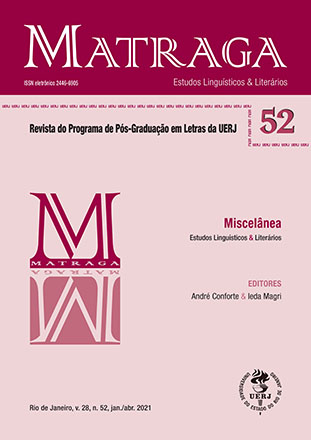Toda a rudeza, na verdade, é calma
DOI:
https://doi.org/10.12957/matraga.2021.52009Palavras-chave:
Poesia, Engajamento, Educação, I Ching.Resumo
Este artigo analisa o livro Poema algum basta, de Maria Amélia Dalvi, com vistas à exposição de sua poética. Em oposição ao que, na poética contemporânea, se pode chamar de metapoesia das coisas, combinação dos legados da Poesia Concreta e da Poesia Marginal, Dalvi faz um salto sobre essas linhas de força em direção à grande tradição modernista, que aproxima construtivismo e engajamento, arte e política, como descreve Silviano Santiago através do conceito de “literatura anfíbia”. Nesse passo, pode-se dizer que a escritora constrói uma “poética da educação”, na qual se encontram presentes tanto a atribuição de função pedagógica ao intelectual em um mundo distópico, quanto a miragem de um horizonte puro, construído pelo trabalho paciente sobre a forma poética depurada. O artigo aproxima ainda as imagens recorrentes da montanha e do mar na poesia de Maria Amélia Dalvi com o hexagrama 4 do I Ching, Imaturidade, cujo tema é a educação.
Downloads
Downloads
Publicado
Como Citar
Edição
Seção
Licença
AUTORIZAÇÃO
A Matraga – Revista do Programa de Pós-Graduação em Letras da UERJ está autorizada a publicar o artigo ora submetido, caso seja aceito para publicação online. Fica atestado que a contribuição é original, que não está sendo submetida a outro editor para publicação, e que a presente declaração é a expressão da verdade.
Os trabalhos publicados no espaço virtual da Matraga – Revista do Programa de Pós-Graduação em Letras da UERJ serão automaticamente cedidos, ficando os seus direitos autorais reservados à Matraga. Sua reprodução, total ou parcial, é condicionada à citação dos autores e dos dados da publicação.

A Matraga utiliza uma Licença Creative Commons - Atribuição-NãoComercial 4.0 Internacional.





